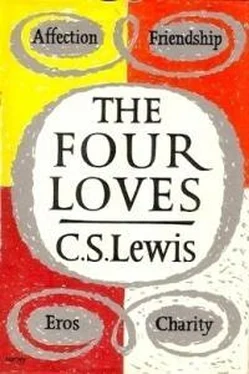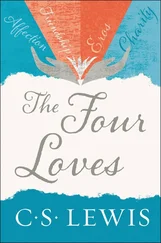When either Affection or Eros is one's theme, one finds a prepared audience. The importance and beauty of both have been stressed and almost exaggerated again and again. Even those who would debunk them are in conscious reaction against this laudatory tradition and, to that extent, influenced by it. But very few modern people think Friendship a love of comparable value or even a love at all. I cannot remember that any poem since In Memoriam , or any novel, has celebrated it. Tristan and Isolde, Antony and Cleopatra, Romeo and Juliet, have innumerable counterparts in modern literature: David and Jonathan, Pylades and Orestes, Roland and Oliver, Amis and Amile, have not. To the Ancients, Friendship seemed the happiest and most fully human of all loves; the crown of life and the school of virtue. The modern world, in comparison, ignores it. We admit of course that besides a wife and family a man needs a few "friends". But the very tone of the admission, and the sort of acquaintanceships which those who make it would describe as "friendships", show clearly that what they are talking about has very little to do with that Philia which Aristotle classified among the virtues or that Amicitia on which Cicero wrote a book. It is something quite marginal; not a main course in life's banquet; a diversion; something that fills up the chinks of one's time. How has this come about?
The first and most obvious answer is that few value it because few experience it. And the possibility of going through life without the experience is rooted in that fact which separates Friendship so sharply from both the other loves. Friendship is—in a sense not at all derogatory to it—the least natural of loves; the least instinctive, organic, biological, gregarious and necessary. It has least commerce with our nerves; there is nothing throaty about it; nothing that quickens the pulse or turns you red and pale. It is essentially between individuals; the moment two men are friends they have in some degree drawn apart together from the herd. Without Eros none of us would have been begotten and without Affection none of us would have been reared; but we can live and breed without Friendship. The species, biologically considered, has no need of it. The pack or herd—the community—may even dislike and distrust it. Its leaders very often do. Headmasters and Headmistresses and Heads of religious communities, colonels and ships' captains, can feel uneasy when close and strong friendships arise between little knots of their subjects.
This (so to call it) "non–natural" quality in Friendship goes far to explain why it was exalted in ancient and medieval times and has come to be made light of in our own. The deepest and most permanent thought of those ages was ascetic and world–renouncing. Nature and emotion and the body were feared as dangers to our souls, or despised as degradations of our human status. Inevitably that sort of love was most prized which seemed most independent, or even defiant, of mere nature. Affection and Eros were too obviously connected with our nerves, too obviously shared with the brutes. You could feel these tugging at your guts and fluttering in your diaphragm. But in Friendship—in that luminous, tranquil, rational world of relationships freely chosen—you got away from all that. This alone, of all the loves, seemed to raise you to the level of gods or angels.
But then came Romanticism and "tearful comedy" and the "return to nature" and the exaltation of Sentiment; and in their train all that great wallow of emotion which, though often criticised, has lasted ever since. Finally, the exaltation of instinct, the dark gods in the blood; whose hierophants may be incapable of male friendship. Under this new dispensation all that had once commended this love now began to work against it. It had not tearful smiles and keepsakes and baby–talk enough to please the sentimentalists. There was not blood and guts enough about it to attract the primitivists. It looked thin and etiolated; a sort of vegetarian substitute for the more organic loves.
Other causes have contributed. To those—and they are now the majority—who see human life merely as a development and complication of animal life all forms of behaviour which cannot produce certificates of an animal origin and of survival value are suspect. Friendship's certificates are not very satisfactory. Again, that outlook which values the collective above the individual necessarily disparages Friendship; it is a relation between men at their highest level of individuality. It withdraws men from collective "togetherness" as surely as solitude itself could do; and more dangerously, for it withdraws them by two's and three's. Some forms of democratic sentiment are naturally hostile to it because it is selective and an affair of the few. To say "These are my friends" implies "Those are not". For all these reasons if a man believes (as I do) that the old estimate of Friendship was the correct one, he can hardly write a chapter on it except as a rehabilitation.
This imposes on me at the outset a very tiresome bit of demolition. It has actually become necessary in our time to rebut the theory that every firm and serious friendship is really homosexual.
The dangerous word really is here important. To say that every Friendship is consciously and explicitly homosexual would be too obviously false; the wiseacres take refuge in the less palpable charge that it is really —unconsciously, cryptically, in some Pickwickian sense—homosexual. And this, though it cannot be proved, can never of course be refuted. The fact that no positive evidence of homosexuality can be discovered in the behaviour of two Friends does not disconcert the wiseacres at all: "That", they say gravely, "is just what we should expect." The very lack of evidence is thus treated as evidence; the absence of smoke proves that the fire is very carefully hidden. Yes—if it exists at all. But we must first prove its existence. Otherwise we are arguing like a man who should say "If there were an invisible cat in that chair, the chair would look empty; but the chair does look empty; therefore there is an invisible cat in it."
A belief in invisible cats cannot perhaps be logically disproved, but it tells us a good deal about those who hold it. Those who cannot conceive Friendship as a substantive love but only as a disguise or elaboration of Eros betray the fact that they have never had a Friend. The rest of us know that though we can have erotic love and friendship for the same person yet in some ways nothing is less like a Friendship than a love–affair. Lovers are always talking to one another about their love; Friends hardly ever about their Friendship. Lovers are normally face to face, absorbed in each other; Friends, side by side, absorbed in some common interest. Above all, Eros (while it lasts) is necessarily between two only. But two, far from being the necessary number for Friendship, is not even the best. And the reason for this is important.
Lamb says somewhere that if, of three friends (A, B, and C), A should die, then B loses not only A but "A's part in C", while C loses not only A but "A's part in B". In each of my friends there is something that only some other friend can fully bring out. By myself I am not large enough to call the whole man into activity; I want other lights than my own to show all his facets. Now that Charles is dead, I shall never again see Ronald's reaction to a specifically Caroline joke. Far from having more of Ronald, having him "to myself" now that Charles is away, I have less of Ronald. Hence true Friendship is the least jealous of loves. Two friends delight to be joined by a third, and three by a fourth, if only the newcomer is qualified to become a real friend. They can then say, as the blessed souls say in Dante, "Here comes one who will augment our loves." For in this love "to divide is not to take away". Of course the scarcity of kindred souls—not to mention practical considerations about the size of rooms and the audibility of voices—set limits to the enlargement of the circle; but within those limits we possess each friend not less but more as the number of those with whom we share him increases. In this, Friendship exhibits a glorious "nearness by resemblance" to Heaven itself where the very multitude of the blessed (which no man can number) increases the fruition which each has of God. For every soul, seeing Him in her own way, doubtless communicates that unique vision to all the rest. That, says an old author, is why the Seraphim in Isaiah's vision are crying "Holy, Holy, Holy" to one another ( Isaiah VI, 3). The more we thus share the Heavenly Bread between us, the more we shall all have.
Читать дальше











